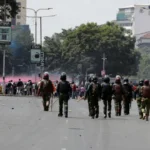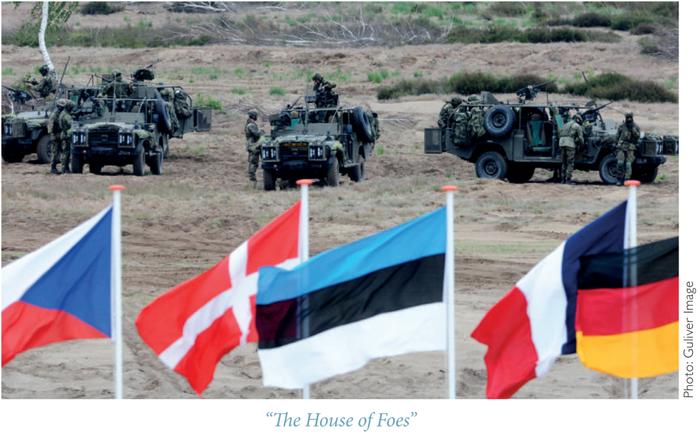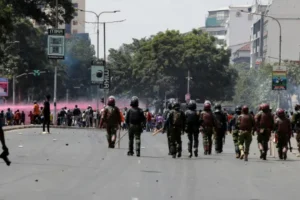The Ukraine crisis has dramatically reshaped Russia. Internally, the Russian economy has survived the unprecedented sanctions and is trying to solve the structural problems since the disintegration of the Soviet Union; the Russian society that was once divided by privatization is learning to unite again and finding common ground through the voluntary actions of the people. cause; a once-scorned patriotism triumphing over the liberal values that dominated the West. Russia urgently needs a set of ideas to guide the future direction of the entire country, and foreign policy is only one of them.
The Two Worlds of Russian Foreign Policy, Screenshot via CIRSD
The First World: “The Enemy’s Club”
The response of the “collective West” to the Russia-Ukraine conflict, especially the deep involvement of NATO, has forced Russia to divide its foreign policy into two distinct parts. To the west of the Russian border lies the officially “unfriendly” “House of Foes” of the United States and its vassal states. Although Russian President Vladimir Putin publicly stated that “unfriendly” only refers to his specific policies. Moreover, the “Concept” also leaves room for a more peaceful future relationship between Russia and the West based on real interests, but its premise is that these countries’ Russia-related policies are completely reshuffled, and the realization of Russia’s goals in Ukraine is also due. .
In any case, the relationship between Russia and the West is difficult to turn around in the short to medium term. It is generally expected in Russia that, in the next 10-15 years, Russia and the West will be in a period of “hybrid war” that may escalate in different fields and degrees. For Russia, this conflict is a matter of life and death, and a little carelessness may completely lose its status as a major power and even national sovereignty. Many in Russia worry that the country will face another disintegration, seeing the situation as serious as the German invasion in 1941 or the defeat in 1917. Russian high-level officials believe that the United States will resolutely defend its hegemony and prevent Russia from returning to the international stage.
However, the changes in the relationship between Russia and the West are only part of the macro transformation process of the world order. In this regard, the United States has chosen the narrative of “great power competition” or “democracy against authoritarianism.” In Russia’s view, the root cause of global conflicts lies in the accelerated shift of the world’s economic, technological and military center of gravity from the North Atlantic to the Eurasian continent; Russia is not a bystander, but one of the promoters.
“The Enemy Club” Source: CIRSD
The Second World: “The House of Partners”
Assumptions about world changes are at the core of Russia’s new worldview, and Russia believes that the rise of countries in Asia, the Middle East, Africa and Latin America is the trend of the future. Based on this judgment, Russia regards these countries as the priority direction of diplomacy. At the same time, this choice is also a forced choice under the sanctions and blockade.
Countries including China, India, Saudi Arabia, Brazil and South Africa have all refused to join the U.S.-led sanctions coalition. Some countries have also significantly expanded trade with Russia, benefiting from cheap Russian oil and gas. Calculated by purchasing power parity (PPP), these countries are larger than the West in terms of population and economic volume. Russian officials regard them as the “world majority” (World Majority) and praise their “balance” and even “construction” towards Russia. sex” position. In Russian foreign policy, this is undoubtedly “The House of Partners”.
Leading the list of partners are China and India, which are equal to Russia as Eurasian powers. The relationship between China and Russia is getting closer, which is mainly due to the internal reasons of the two countries, but the adventurous policy of the United States also plays a role from the outside. Although Putin did not report the upcoming actions in Ukraine when he visited Beijing in February 2022, China has not alienated relations with Russia. During a return visit in March of the following year, Chinese leaders told Putin that China and Russia were jointly promoting “a change unseen in a century.” There is no doubt that the “Kissinger Triangle” of the 1970s has been subverted, and the dual containment of China and Russia is counterproductive.
India, whose status as an independent great power has been tested in the Ukraine crisis, has been carefully balancing so as not to alienate Russia. Both Russia and India hope to bring bilateral relations closer to the level of Sino-Russian relations. Of course, Russia’s goal is also to facilitate Sino-Indian reconciliation and make the Russia-India-China Trilateral Relations (RIC) the new Eurasian geopolitical core. This is difficult, but far from impossible.
More recently, China has brokered a rapprochement between Saudi Arabia and Iran, the first major peace deal in the Middle East that excludes the United States in decades. Russia welcomes China’s diplomatic achievements, as both countries benefit from the synergy of their parallel diplomacy. At the same time, Saudi Arabia cooperates with China and Russia in oil production and settlement. Iran, which is about to become a member of the Shanghai Cooperation Organization, has close economic and military relations with the two countries. At the same time, China, Russia, Iran, India, and Pakistan (Pakistan) are also cooperating in Afghanistan to ensure the stability of the regional situation after the Taliban takes power for the second time.
Going back to Russia itself, it continues to lead efforts aimed at a peaceful solution to the Syrian issue in coordination with the Arab states, Turkey and Iran; Turkey and the UAE have become Russia’s new hubs connecting the world; and Iran is in Moscow’s “North-South Corridor” linking St. Petersburg and Mumbai important role in the plan.
Breaking down the three pillars of American hegemony
Russia’s priority goals in Asia, Africa and Latin America should be based on the “new type of international relations” jointly advocated by China and Russia. Russia’s appeal is to replace the old international structure with a brand new one, while China is only trying to adjust the distribution of power in the existing structure. However, China and Russia can work together to end US hegemony.
The “multi-polar world” concept that China and Russia adhere to has now been recognized by more countries, and its connotation should be different from the joint governance of a few big countries or small circles. The multi-polar system advocated by the BRICS countries requires mutual respect as the basis, and the practice of true multilateralism rather than allowing powerful countries to act arbitrarily. Key areas for establishing a new multipolar world order include finance, security, and information, and Russia can contribute in each.
A key pillar of American hegemony is a financial and monetary system based on the dollar. “De-dollarization” is not only the preference of countries with tense relations with the United States, but also a means of hedging risks for countries with better relations with the United States. At present, most of the bilateral trade between China, Russia and Russia and India has been settled in local currency. Another major breakthrough is the implementation of similar arrangements between China and Brazil. If the Gulf countries can follow suit, this trend will be greatly enhanced. Although the renminbi has some limitations, it has still become an important payment tool between these countries. The BRICS countries should now focus on establishing a world digital currency that cannot be manipulated by any country alone. If successful, the BRICS countries will hopefully lead the formulation of basic rules for the financial system in the 21st century.
Another pillar of US hegemony is its system of security alliances and partnerships. It is meaningless for the “majority of the world” countries to imitate this, and the reasonable approach is to develop the SCO into an international stability and cooperation system covering the Eurasian continent. In various forms, the organization has covered most of Eurasia except for a corner in the west. Such a system would be based on mutual respect, jointly developed and consistently applied rules, underpinned by building trust and ensuring channels of communication and coordination. The task may be harder than building a new monetary system, but there is hope. For example, stable and productive Sino-Russian relations ended three decades of hostility and greatly frustrated Western skeptics; the United States saw itself as the dominant power across Eurasia in the early 21st century, but the heartland of the continent is now It is basically controlled and managed by the Eurasian powers themselves.
American hegemony is also rooted in the control of the global media by the Anglo-Saxon media. If the “majority of the world” countries want to truly liberate from foreign hegemony, they need to base themselves on the multiculturalism of the world and develop original ideas. They should build a media alliance to promote their narratives and insights. Al-Jazeera, Russia Today, Iran’s English-language news TV, and China Global Television are testament to what a single country can achieve. Indian media also has considerable resources and potential, and the prospects for these countries to work together are extremely bright. This mechanism should not be an anti-Western propaganda tool, but should target non-Western audiences and become a mechanism for building consensus and creating a shared future.
 On June 18, Russian President Vladimir Putin met with South African President Cyril Ramaphosa in St. Petersburg. Picture from Russian Satellite Agency
On June 18, Russian President Vladimir Putin met with South African President Cyril Ramaphosa in St. Petersburg. Picture from Russian Satellite Agency
”Russian Federation 2.0″ process
The Vision sees Russia as a distinct “civilization-state”, while previous documents included Russia as the successor of Europe. For Russian elites, they need time and ingenuity to perfect a new worldview and set an example; they must sort out and evaluate the country’s intellectual heritage and historical experience; And the idea of ”why”; in the end, it is necessary to convince the Russian people and devote themselves to this cause… If the claim of “civilization” is not empty words, it cannot be avoided or tricked. These elites should also think about what Russia has to offer other countries, especially in a targeted role in various frameworks ranging from post-Soviet spaces to non-Western international forums.
Faced with this complex and difficult task, Russia’s current available resources can only meet part of its needs. But Russia’s economic power, while limited, remains highly resilient and adaptable; its policy tools will be used creatively in the new geopolitical environment. Russia’s military strength has been severely damaged in Ukraine, but it has also been tempered and upgraded. Russia’s human resources, despite decades of neglect and exodus, are still considerable; more importantly, they can better fit the country’s needs.
As for Russia’s diplomatic prowess, it needs a major reorganization: divert some resources from Europe and the United States, where diplomatic needs have fallen sharply; retrain more diplomats to serve non-Western regions; expand foreign language education and regional studies, including on the former Soviet Union Union republics, because it is no longer enough to study these countries in Russian alone; domestic education needs to incorporate more content on non-Western civilizations; international communication should also overcome the tendency to focus too much on the West.
The foregoing outlines some of the specifics of what I have long termed a process called “Russian Federation 2.0,” which includes a fundamental reorientation of foreign policy. This transition was not planned—if SOMO were to succeed quickly with the limited goals previously anticipated, it might never come. The delay of the war also raised the stakes to the highest. If Russia fails in the transformation, the bitter fruit will not only be swallowed by Russia alone; if it succeeds, the “majority of the world” will benefit from this experienced, more capable member who is ready to join the new international order.
(This article was originally published in Issue 23 of Horizons, a journal sponsored by the Center for International Relations and Sustainable Development (CIRSD), compiled by WeChat account “Russia and the World Watch”.)
Source: k.sina











